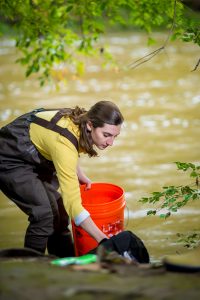Caroline Bottega – Environmental Science ’19
Caroline Bottega is an Environmental Science major in the Restoration Ecology Track and a Geology minor. Caroline’s interest in the environment began at a young age with early exposure to outdoor experiences such has backpacking in California. In seventh grade, she participated in an ecology program at Rutgers University, in partnership with her school. She then maintained an interest in science and biology throughout high school. The appeal of blending science with the opportunity to be outside and active drew Caroline to the Environmental Science major at Lafayette.
Caroline had the opportunity to experience outdoor fieldwork and learning while on an interim trip to Iceland offered by the Geology Department. The trip involved being out in the field every day. Actually experiencing the atmosphere while learning made the material easier to take in. The Iceland trip was just one of many unique experiences for Bottega while at Lafayette. Another was visiting the Chesapeake Bay Foundation as part of Professor Andrea Armstrong’s EVST 220 Places, People and Environments of the Mid-Atlantic course where they met with the foundation’s president and dredged for oysters.
Bottega views completing undergraduate research as the most transformative experience she has had during her time at Lafayette. She has assisted Professor Megan Rothenberger in the Biology Department with research focusing on Easton’s Bushkill Creek. She has learned research and sampling methods and is now applying those techniques in the field and toward completion of her senior thesis project titled, “A Multidisciplinary Risk Assessment Study Prior to Dam Removal in Bushkill Creek, PA.”
In addition to research, Caroline also completed a summer internship at Langan, an environmental engineering and consulting firm. During her internship, she prepared preliminary assessment reports, looking at contaminant concentrations and mapping the best way to remediate them. On campus, Caroline served as a Teaching Assistant for a geology class and as a Writing Associate for a Geology First Year Seminar course.
Caroline plans to take a year between Lafayette and graduate school to complete work in the environmental education field, potentially for a non-profit organization. Her long-term goal is to attend graduate school to pursue either a master’s degree or Ph.D. and work in environmental education at either the high school or college level.
When asked what advice she would give to students considering a major in environmental science or studies, Caroline said students should use their passions as motivation. “Don’t be embarrassed to get excited about your major. If you have a passion for something, you are lucky and fortunate and should stick with it,” she explained. Environmental topics cross many disciplines and can open many doors for students.
